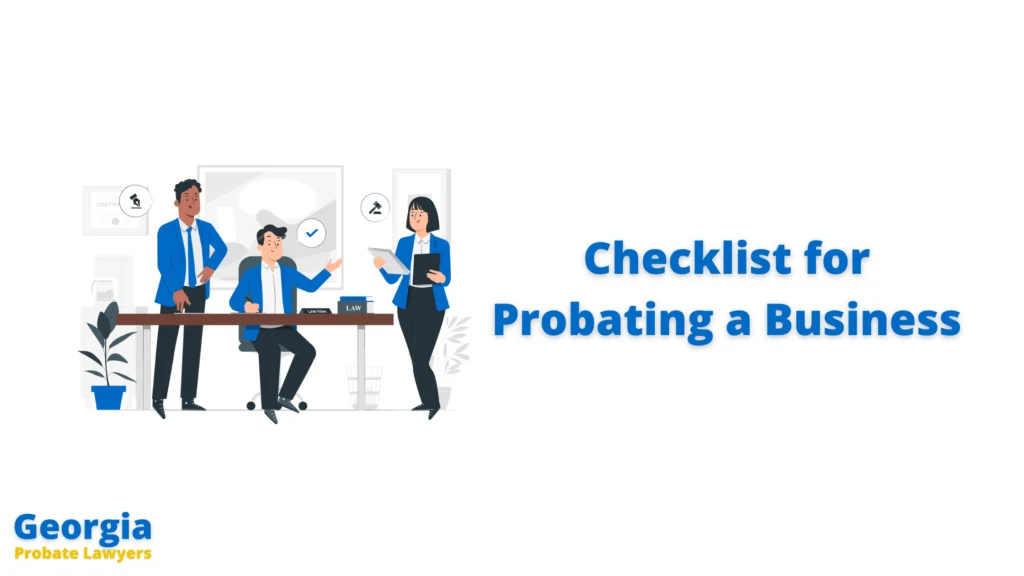
When a business owner passes away, someone has to take care of what’s left behind.
If that someone is you, and you’re feeling overwhelmed, you’re not alone.
Most people haven’t gone through probate before—especially not for a business.
This resource is your full checklist for probating a business in Georgia, written in plain English.
No fluff, no confusing legal terms—just clear steps, helpful examples, and tips that make everything easier.
Avoid the delays, expenses, and public exposure of probate.
Schedule your free, no-pressure Estate Planning Roadmap Call today.
"*" indicates required fields
What This Means:
Before you can legally sell, transfer, or close a business after someone dies, you usually have to go through probate—a court process that proves the will (if there is one), pays off debts, and distributes what’s left.
Why This Matters:
You can’t legally access business assets, transfer ownership, or make decisions on behalf of the business until probate starts and you’re officially named as the executor (if there’s a will) or administrator (if there’s no will).
Key Terms:
What This Means:
You can’t handle the business until the court gives you legal authority.
Action Steps:
Tip: Bring a copy of the death certificate and any business documents you can find (LLC paperwork, tax returns, etc.).
What This Means:
Before you can sell or transfer anything, you need to make sure the business is safe and still running—if it’s active.
Action Steps:
Example:
If the business has customers still paying invoices, set up a way to collect that money into the estate account. Don’t use personal accounts.
What This Means:
You’ll need to know what the business owns, what it owes, and what it’s worth.
Action Steps:
Tip: Make a digital folder to keep everything organized. You may need this later to file taxes or sell the business.
What This Means:
If the business is going to be sold or transferred, you may need a professional appraisal to figure out what it’s worth.
Action Steps:
What This Means:
Before any money or property can be handed out, the estate (including the business) has to settle its debts.
Action Steps:
Tip: Keep track of every payment and keep receipts. You may need to show the court a full accounting.
What This Means:
Once everything is paid and approved by the court, the business can be sold, closed, or transferred to an heir.
Options:
Action Steps:
Tip: If you’re unsure whether to sell or transfer the business, talk with any heirs involved and consider getting a business valuation first. This helps avoid disagreements later.
What This Means:
Once all debts are paid, taxes are filed, and the business is fully handled, you’re almost done.
Action Steps:
Tip: Make a final checklist of everything you’ve done. It helps if the court or an heir ever has questions down the line.
Here are questions people ask us when trying to figure out how to probate a business in Georgia.
Only if you’ve been officially appointed by the court.
Once you have your Letters, you can manage the business temporarily.
You may still need to close it properly and notify the state to avoid future tax or filing issues.
No. Debts should be paid from the estate or business assets—not from your personal funds.
You’ll need to check the operating agreement or partnership documents.
Some allow the surviving owner to buy out the deceased’s share.
Dealing with probate and trying to probate a business on your own?
You don’t have to guess—or risk doing it wrong.
Book a free consultation with our Georgia probate team.
We’ll review your situation, explain exactly what needs to happen, and give you a clear plan—no pressure, no confusion.
👉 Fill out the form below to schedule your free call now.
Let’s take the weight off your shoulders.
Avoid the delays, expenses, and public exposure of probate.
Schedule your free, no-pressure Estate Planning Roadmap Call today.
"*" indicates required fields
Our Georgia probate lawyers work remotely, so you don’t have to visit an office. Here are all the counties we serve in Georgia.